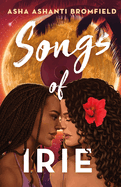
Asha Ashanti Bromfield's second YA novel, after Hurricane Summer, is an arresting, romantic coming-of-age story set during a time of intense political violence in Jamaica.
In 1976, "Jamaica is under a tribal war" between opposing political factions, and "talking about politics can easily get you killed." Best friends Jilly and Irie exemplify the stark divide between the country's rich and poor: the girls attend the same school in Kingston, but Jilly's family are "fairly-complected, mixed race, and extremely well off" while "fully Black" Irie's family lives in "the heart of the ghetto" where violence and poverty are daily realities. Jilly and Irie have bonded over a shared love of reggae music, sound that was "born in rebellion to... political violence and centuries of oppression." The radical songs introduce Jilly to a world beyond her sheltered upbringing; Irie finds an outlet in writing her own reggae music that expresses her desire for "an end to the pain and suffering." Over the course of a summer the girls' friendship evolves into a heady, passionate romance that is threatened by the mounting tension in Kingston's streets.
Bromfield creates a piercing examination of colonialism, economic inequality, and privilege, told from the first-person perspectives of two teenagers questioning their responsibilities and desires. The author conveys the emotional intensity of a relationship between queer young women that "toe[s] the line between lovers and friends." Songs of Irie breathes radiant life into Jamaican history and illuminates present-day struggles for equality. --Alanna Felton, freelance reviewer

